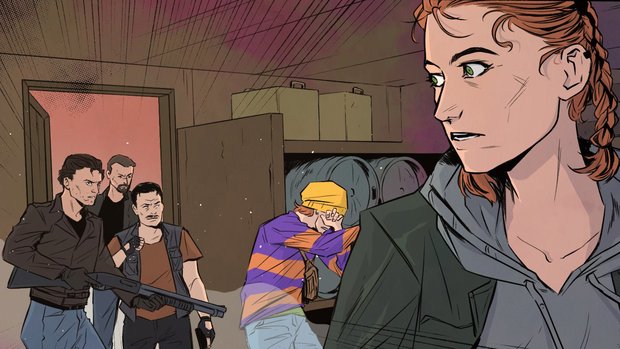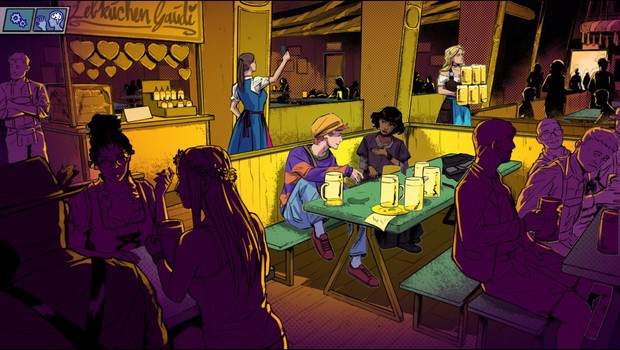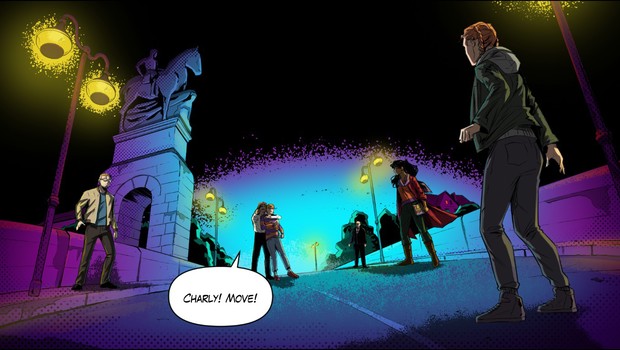Hauma: A Detective Noir Story review

- 0 Comments
Occasionally misfires but an honest-to-goodness graphic novel-style mystery
My first few minutes with SenAm Games’ detective thriller Hauma – A Detective Noir Story brought with them a kind of nostalgic homecoming: a game set in Germany; a young investigator becoming embroiled in a mystery rooted in ancient history; a case passed down through several generations of a family tree, with a protagonist desperately trying to retread an ancestor’s footsteps; a secret malevolent society on the hunt for a mythical artifact of immense power. It’s fair to say that certain parallels could easily be drawn with one of the adventure genre’s all-time greatest classics. However, despite its (likely) inspiration, Hauma forges its own path – visually, narratively and especially in terms of gameplay, even if that path consists of more byways than highways and includes a few missteps all its own.
The game stars Judith, an ex-cop who was kicked off the Munich police force after getting too close to things not meant for prying eyes and now spends her time investigating the circumstances surrounding her firing and the suspicious “accident” that almost claimed her life. After an anonymous letter shoved under her apartment door (as well as a drunken voicemail from her brother JB), Judith heads to the Oktoberfest celebration where she runs afoul of some suspicious characters who are in the process of rigging up a bomb amid the crowded festival grounds. Failing to prevent the (luckily nonlethal) explosion, Judith returns to her apartment where she is promptly abducted by one of the Oktoberfest bombers. Some time later, Judith reawakens back in her flat, with no memory of where she was taken, or why. Much of the story from here follows Judith’s journey to regain her memories and learn the identity of the Oktoberfest terrorists, sending her on the trail of a centuries-old mystery surrounding an ancient magical artifact and the supposed secret of eternal life.

Unfortunately, large chunks of Hauma’s narrative – especially the early beats, before the latter half deep-dives into history and myth – are a little haphazardly stitched together. Judith’s bout of insomnia seems like little more than a convenient plot device that doesn’t feel particularly earned, just a way to send players on a wild goose chase for a while. It also leads to some shoehorned-in puzzles as you must occasionally regain bits and pieces of Judith’s lost memory – literally connecting the dots for her – so that she will, say, gain access to a new location to explore. Once a few pieces fall into place and we dispense with filling in the memory gaps in favor of unearthing the far more involving enigma spanning the ages from antiquity to present day, the tale naturally becomes more engaging.
However, even after the storytelling picks up, many of the challenges still revolve around a rather awkward mechanic built into the game’s inventory-based puzzles. What we traditionally know as an inventory screen that houses various acquired items doubles here as a “mindboard,” a place where Judith orders her thoughts and makes concrete connections between concepts. As a result, items share space with thoughts and ideas – represented by tangible icons – and it is often necessary to deduce links between related items and topics by dragging a line from one to the other in order to advance Judith’s investigation.

Judith also comes across a journal left by her grandfather, who was investigating the same mystery in which she now finds herself embroiled. Establishing links between certain items and the journal may reveal particular new pages with further vital information (though it’s unclear why Judith can’t just thumb through the journal at will). Unfortunately, with so many icons sharing space on the inventory screen, quite a few times I found choosing the correct two items to link together for the next deduction to become a crapshoot, and I soon resorted to the far less satisfying method of brute-forcing every possible combination until one yielded a result. It has the potential to be an interesting idea, but its implementation lacks the finesse and specificity that would make dealing with it more enjoyable. And outside of inventory screen shenanigans there is little actual investigating to do, in favor of the usual “find a way to distract the cop” and “lure the visitors away from the exhibit” fare.
Apart from this less-hit-than-miss twist on the classic inventory system, Hauma utilizes traditionally straightforward point-and-click gameplay. There are only a few interactive spots in each scene that light up as soon as the mouse passes over them, preventing tedious pixel hunting with easily identifiable, usually prominent hotspots. Judith herself does not usually appear on-screen (apart from the game’s climax and during dialogue and action scenes). A map screen makes travel a cinch, once new locations have been unlocked, and there are rarely more than a couple of places available to choose from at any given time, making it fairly easy to proceed without becoming stuck. In fact, the level of overall challenge is somewhat low, not counting the connect-the-dots inventory puzzles, which aren’t difficult so much as unintuitive. Surprisingly, the game’s climax takes an entirely different tack, including a timed element that necessitated a number of retries for me to complete successfully, a feature not found anywhere else in this four-hour game.
The locations you explore are set within a realistic depiction of Munich, like a museum and a cathedral, but the stylistic choices fit the bill of a “noir detective story” quite well, and the hand-painted aesthetic certainly lends the production a good deal of character. While it doesn’t particularly appeal to me personally, the art style evokes the look of a graphic novel, with comic book panels used during dialogue, implied kineticism during action set pieces, and an overall color palette that leans toward trippy surrealism, dominated by purples, yellows, blues, and greens. It also lacks any actual animation (apart from the odd element like a swaying punching bag or dust motes floating in the air), but portraits during dialogue at least have a number of expressions the characters pivot between.
The entire game is voiced, and most of the actors portray their characters very well. Unfortunately, the voice-overs do suffer from a pet peeve of mine: foreign-language words being routinely butchered during the English line delivery. In this case it’s German, which is ironic since the developers themselves are based there. It’s not egregious by any means – you can tell the actors are certainly trying, and those unfamiliar with the language will never notice that “Wolpertingerbräu,” for instance, is understandably mispronounced. Musical selections are limited in number but work well; the game’s go-to action-slash-suspense track struck me as being incredibly reminiscent of a particular early-90s game about a certain Schattenjäger, in all the best ways.
Final Verdict
Ultimately, Hauma is a capable if not particularly ambitious point-and-click adventure with a certain sense of familiarity baked right into its DNA. Though it presents an intriguing historical mystery, I can’t help but feel a little let down by the way the narrative initially ambles along the less captivating amnesia path before striking paydirt. At least of equal importance are the puzzles, which sound promising with the inclusion of the protagonist’s mindboard into the mix, but fail to capitalize on it with puzzle sections that end up more unwieldy than engaging. The graphic novel-style presentation is nice enough, but it’s the gameplay and storytelling that sell the game just a little short of what it could have been.
Hot take
While there are certainly aspects that work in Hauma’s graphic novel-styled exploration through Munich to unearth a mystery about an ancient relic spanning the ages, the game’s pacing and finicky inventory puzzles demand some patience to get to its best stuff.
Pros
- Interesting historical mystery to uncover
- Talented voice acting throughout
- Limited but on-point musical selections
Cons
- Mindboard system feels too ambiguous and overly complicated
- Slow narrative build-up treads water during the first few hours
- Comic book presentation means a lack of animation
Pascal played Hauma – A Detective Noir Story on PC using a review code provided by the game's publisher.










0 Comments
Want to join the discussion? Leave a comment as guest, sign in or register in our forums.
Leave a comment